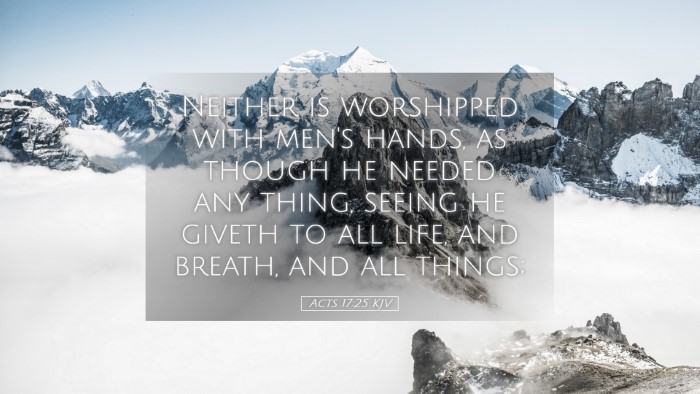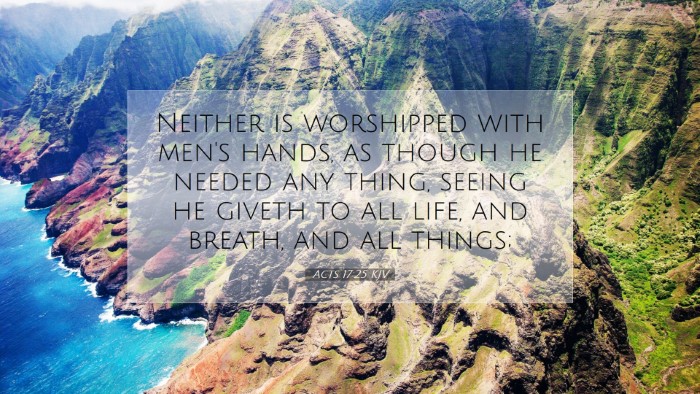Commentary on Acts 17:25
Verse: "Neither is worshipped with men's hands, as though he needed any thing, seeing he giveth to all life, and breath, and all things;" (Acts 17:25, KJV)
Introduction
The Apostle Paul, in his address to the philosophers at Athens, presents a profound understanding of the nature of God. Acts 17:25 emphasizes God's self-sufficiency and the futility of attempts to confine Him within human constructs or needs. The insights from various public domain commentaries help us unpack this verse’s layers of meaning.
Contextual Overview
The Book of Acts chronicles the early church's spread and Paul's missionary journeys. In chapter 17, Paul engages with Athenian thinkers who idolized gods of their imagination. He challenges their understanding of divinity, illustrating a God who transcends human limitations.
Key Insights from Commentaries
-
Matthew Henry:
Henry emphasizes the idea that God does not require human assistance or offerings for sustenance. He suggests that the worship of God should flow from a recognition of His fullness and sufficiency. The natural world reveals His creative power, as He "giveth to all life, and breath, and all things."
-
Albert Barnes:
Barnes notes that the phrase "as though he needed anything" highlights the absurdity of thinking that God could require something from His creation. He elucidates that God's independence from human needs underscores His sovereignty and dominion over all creation.
-
Adam Clarke:
Clarke places emphasis on the active role of God as the giver of life, breathing life into man and sustaining all living things. He argues that God's generosity is central to understanding worship; it is not about presenting gifts to God but recognizing His eternal source of all blessings.
Theological Implications
This verse presents several theological themes worthy of consideration:
- Divine Sovereignty: Acts 17:25 asserts that God is not dependent on His creation. His sovereignty is manifest in His ability to give life without needing anything from mankind.
- Human Worship: The insistence that God is not worshipped with “men's hands” calls into question ritualistic forms of worship that emphasize human action rather than recognizing God’s ultimate authority.
- God's Generosity: This verse requisitely invites believers to contemplate the nature of God as generous and giving. Rather than a deity who demands, God offers all life and existence freely.
Practical Applications
For pastors, theologians, and students of the Bible, Acts 17:25 provides several applications:
- Redefining Worship: Understand worship as an acknowledgment of who God is rather than what we may present to Him. It fosters a heart of gratitude instead of transactional thinking.
- Encouraging Dependence on God: Emphasize reliance on God's provision. This can combat stress and anxiety, reinforcing the belief that "He knows what we need before we ask."
- Witness to the World: Reflecting on God's self-sufficiency can inspire Christians to engage with others confidently, knowing that the God we serve does not depend on human effort.
Conclusion
Acts 17:25 serves as a reminder of the greatness of God and a challenge to believers to align their understanding and practice of worship with His divine identity. By synthesizing insights from respected commentaries, we deepen our appreciation of God's nature, which is foundational for spiritual growth and communal worship. Understanding God's self-sufficiency can direct our hearts and minds toward a truer worship experience—one rooted in reverence, gratitude, and a profound acknowledgment of God's role as the giver of life.


